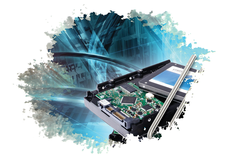Managing SSD tools with TKperf
No Detour

TKperf combines several SSD tools under one roof. You can use TKperf to investigate SSDs before deployment and even to measure performance.
Linux offers several low-level tools for investigating solid state drives (SSDs). Admins are well advised to deploy these tools immediately, because they overwrite all data, which is a problem for SSDs in production use. One example of an SSD tool is FIO [1], an I/O-benchmarking application by Jens Axboe. Upon request, FIO bypasses the Linux page cache, starts multiple jobs in parallel, and runs with different I/O depths and workloads.
The tool can even claim Linus Torvalds' blessings. "It does things right, including writing actual pseudo-random contents, which shows if the disk does some "de-duplication" (aka "optimize for benchmarks)," Torvalds posted on Google Plus in 2012. "Anything else is suspect – forget about bonnie or other traditional tools," he added.
Hdparm [2] is also an old friend that can set and read parameters on (S)ATA hard disk drives; recent versions of Hdparm even support SSDs. Hdparm is capable of obtaining information about SSDs, and it also has a secure erase feature that erases the contents of the pages.
[...]
Buy this article as PDF
(incl. VAT)
Buy Linux Magazine
Subscribe to our Linux Newsletters
Find Linux and Open Source Jobs
Subscribe to our ADMIN Newsletters
Support Our Work
Linux Magazine content is made possible with support from readers like you. Please consider contributing when you’ve found an article to be beneficial.

News
-
The Next Linux Kernel Turns 7.0
Linus Torvalds has announced that after Linux kernel 6.19, we'll finally reach the 7.0 iteration stage.
-
Linux From Scratch Drops SysVinit Support
LFS will no longer support SysVinit.
-
LibreOffice 26.2 Now Available
With new features, improvements, and bug fixes, LibreOffice 26.2 delivers a modern, polished office suite without compromise.
-
Linux Kernel Project Releases Project Continuity Document
What happens to Linux when there's no Linus? It's a question many of us have asked over the years, and it seems it's also on the minds of the Linux kernel project.
-
Mecha Systems Introduces Linux Handheld
Mecha Systems has revealed its Mecha Comet, a new handheld computer powered by – you guessed it – Linux.
-
MX Linux 25.1 Features Dual Init System ISO
The latest release of MX Linux caters to lovers of two different init systems and even offers instructions on how to transition.
-
Photoshop on Linux?
A developer has patched Wine so that it'll run specific versions of Photoshop that depend on Adobe Creative Cloud.
-
Linux Mint 22.3 Now Available with New Tools
Linux Mint 22.3 has been released with a pair of new tools for system admins and some pretty cool new features.
-
New Linux Malware Targets Cloud-Based Linux Installations
VoidLink, a new Linux malware, should be of real concern because of its stealth and customization.
-
Say Goodbye to Middle-Mouse Paste
Both Gnome and Firefox have proposed getting rid of a long-time favorite Linux feature.
